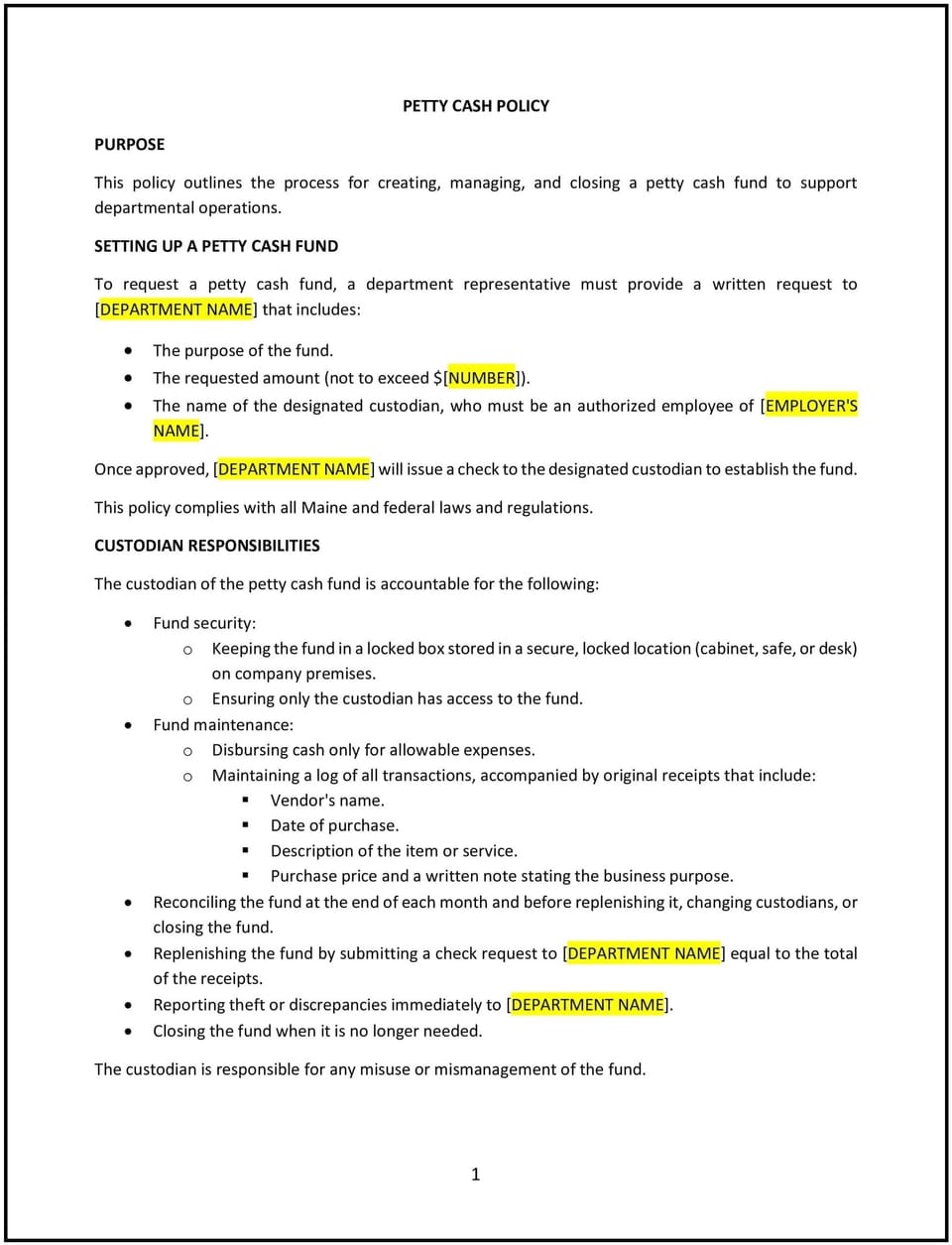Petty cash policy (Maine): Free template

Petty cash policy (Maine): Free template
This petty cash policy is designed to help Maine businesses manage small, incidental expenses by providing employees with access to a petty cash fund. It outlines procedures for requesting, using, and tracking petty cash to ensure accountability, minimize misuse, and comply with company standards and financial regulations.
By implementing this policy, Maine businesses can streamline the management of minor expenditures while maintaining financial control and transparency.
How to use this petty cash policy (Maine)
- Define petty cash: Clearly explain what constitutes petty cash, including small, non-recurring expenses such as office supplies, postage, or minor repairs that do not require formal purchase orders.
- Set fund limits: Specify the maximum amount of petty cash available at any given time, including limits for individual transactions.
- Establish request procedures: Outline the process for employees to request access to petty cash, including approval requirements, documentation, and reasons for the expenditure.
- Track expenditures: Require detailed records of each petty cash transaction, including receipts, the purpose of the expense, and the amount used, to ensure accountability and proper financial reporting.
- Replenishment procedures: Explain how and when the petty cash fund will be replenished, including who is responsible for maintaining the fund’s balance.
- Address misuse: Detail the consequences for misusing petty cash, such as unauthorized purchases or failure to submit proper documentation.
- Review regularly: Update the policy as necessary to reflect changes in business needs, financial controls, or legal requirements.
Benefits of using this petty cash policy (Maine)
Implementing this policy provides several benefits for Maine businesses:
- Ensures financial control: Keeps small expenses within budget and prevents misuse of company funds.
- Promotes accountability: Requires employees to document and justify petty cash expenditures, ensuring that all funds are accounted for.
- Reduces administrative burden: Simplifies the process for managing minor expenses without needing formal approval processes for every small purchase.
- Prevents fraud: Establishes clear rules for the use of petty cash, minimizing opportunities for misuse or fraud.
- Enhances transparency: Creates a transparent process for handling and tracking small expenses, making it easier to audit and monitor spending.
Tips for using this petty cash policy (Maine)
- Train employees: Provide training on how to request and use petty cash responsibly, including the importance of submitting receipts and following the approval process.
- Implement tracking tools: Use accounting software or logs to track petty cash transactions and maintain an accurate record of the fund’s status.
- Monitor fund usage: Regularly audit petty cash transactions to ensure compliance with the policy and identify any discrepancies.
- Set clear approval guidelines: Ensure that petty cash requests are approved by authorized personnel and are documented appropriately.
- Stay compliant: Regularly review changes to Maine financial regulations to ensure that the policy remains compliant and effective.
Q: What is considered an appropriate use of petty cash?
A: Appropriate uses of petty cash include small, one-time expenses such as office supplies, postage, or minor repairs that are not part of regular business operations and do not require formal purchase orders.
Q: How much petty cash can be accessed at one time?
A: The policy should define a maximum limit for individual petty cash transactions and the total amount that can be held in the petty cash fund at any given time.
Q: How should employees request petty cash?
A: Employees should submit a request for petty cash to an authorized manager, specifying the purpose of the expenditure and providing necessary documentation, such as receipts.
Q: What happens if petty cash is misused?
A: Misuse of petty cash, such as unauthorized spending or failure to submit receipts, may result in disciplinary actions as outlined in the policy.
Q: How is the petty cash fund replenished?
A: Petty cash is replenished by submitting a request for additional funds, accompanied by the necessary documentation and proof of expenditure.
Q: How often should businesses review their petty cash policy?
A: Businesses should review the policy annually or whenever there are changes in financial regulations or business practices that could impact petty cash management.
This article contains general legal information and does not contain legal advice. Cobrief is not a law firm or a substitute for an attorney or law firm. The law is complex and changes often. For legal advice, please ask a lawyer.


